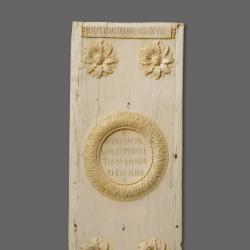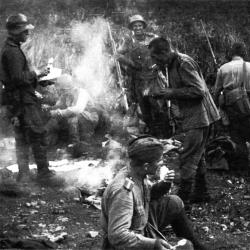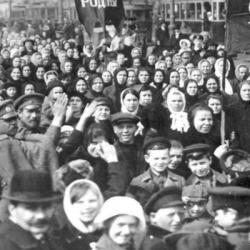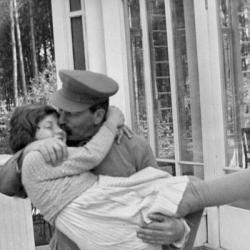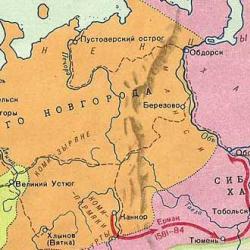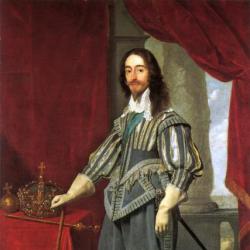When was the revolution of 1917. The Great October Socialist Revolution. The course of the February Revolution
1917 is the year of upheavals and revolutions in Russia, and its finale came on the night of October 25, when all power passed to the Soviets. What are the causes, course, results of the Great October Socialist Revolution - these and other questions of history are at the center of our attention today.
Causes
Many historians argue that the events that took place in October 1917 were inevitable and at the same time unexpected. Why? Inevitable, because by that time a certain situation had developed in the Russian Empire, which predetermined the further course of history. This was due to a number of reasons:
- Results of the February Revolution : she was greeted with unprecedented enthusiasm and enthusiasm, which soon turned into the opposite - bitter disappointment. Indeed, the performance of the revolutionary-minded "lower classes" - soldiers, workers and peasants, led to a serious shift - the overthrow of the monarchy. But this is where the achievements of the revolution ended. The expected reforms "hung in the air": the longer the Provisional Government put off consideration of pressing problems, the faster discontent in society grew;
- Overthrow of the monarchy : March 2 (15), 1917 Russian Emperor Nicholas II signed the abdication. However, the question of the form of government in Russia - a monarchy or a republic, remained open. The provisional government decided to consider it during the next convocation of the Constituent Assembly. Such uncertainty could lead to only one thing - anarchy, which happened.
- The mediocre policy of the Provisional Government : the slogans under which the February Revolution took place, its aspirations and achievements were actually buried by the actions of the Provisional Government: Russia's participation in the First World War continued; a majority vote in the government blocked the land reform and the reduction of the working day to 8 hours; the autocracy was not annulled;
- Russia's participation in the First World War: any war is an extremely costly undertaking. It literally "sucks" all the juices out of the country: people, production, money - everything goes to its maintenance. The First World War was no exception, and Russia's participation in it undermined the country's economy. After the February Revolution, the Provisional Government did not retreat from its obligations to the allies. But discipline in the army was already undermined, and general desertion began in the army.
- Anarchy: already in the name of the government of that period - the Provisional Government, the spirit of the times can be traced - order and stability were destroyed, and they were replaced by anarchy - anarchy, lawlessness, confusion, spontaneity. This manifested itself in all spheres of the country's life: an autonomous government was formed in Siberia, which was not subordinate to the capital; Finland and Poland declared independence; in the villages, the peasants were engaged in unauthorized redistribution of land, burned the landowners' estates; the government was mainly engaged in the struggle with the Soviets for power; the disintegration of the army and many other events;
- The rapid growth of the influence of the Soviets of Workers' and Soldiers' Deputies : During the February Revolution, the Bolshevik Party was not among the most popular. But over time, this organization becomes the main political player. Their populist slogans for an immediate end to the war and for reforms found great support among the embittered workers, peasants, soldiers and police. Not the last was the role of Lenin as the founder and leader of the Bolshevik Party, which carried out the October Revolution of 1917.

Rice. 1. Mass strikes in 1917
Stages of the uprising
Before speaking briefly about the revolution of 1917 in Russia, it is necessary to answer the question of the suddenness of the uprising itself. The fact is that the actually established dual power in the country - the Provisional Government and the Bolsheviks, should have ended in some kind of explosion and in the future with the victory of one of the parties. Therefore, the Soviets began preparations for the seizure of power in August, and the government at that time was preparing and taking measures to prevent it. But the events that happened on the night of October 25, 1917 came as a complete surprise to the latter. The consequences of the establishment of Soviet power also became unpredictable.
As early as October 16, 1917, the Central Committee of the Bolshevik Party made a fateful decision - to prepare for an armed uprising.
On October 18, the Petrograd garrison refused to submit to the Provisional Government, and already on October 21, representatives of the garrison declared their submission to the Petrograd Soviet, as the only representative of the legitimate authority in the country. Starting on October 24, the key points of Petrograd - bridges, railway stations, telegraphs, banks, power plants and printing houses - were captured by the Military Revolutionary Committee. On the morning of October 25, the Provisional Government held only one object - the Winter Palace. Despite this, at 10 o'clock in the morning of the same day, an appeal was issued, which announced that henceforth the Petrograd Soviet of Workers' and Soldiers' Deputies was the only body of state power in Russia.
In the evening at 9 o'clock, a blank shot from the Aurora cruiser signaled the beginning of the assault on the Winter Palace, and on the night of October 26, members of the Provisional Government were arrested.

Rice. 2. The streets of Petrograd on the eve of the uprising
Results
As you know, history does not like the subjunctive mood. It is impossible to say what would have happened if this or that event had not happened and vice versa. Everything that happens happens due to not a single reason, but a multitude that at one moment intersected at one point and showed the world an event with all its positive and negative aspects: a civil war, a huge number of deaths, millions who left the country forever, terror, the construction of an industrial power , the elimination of illiteracy, free education, medical care, building the world's first socialist state, and much more. But, but speaking about the main significance of the October Revolution of 1917, one thing should be said - it was a profound revolution in the ideology, economy and structure of the state as a whole, which influenced not only the course of the history of Russia, but of the whole world.
The October Revolution of 1917 took place on October 25 according to the old or November 7 according to the new style. The initiator, ideologist and protagonist of the revolution was the Bolshevik Party (Russian Social Democratic Bolshevik Party), led by Vladimir Ilyich Ulyanov (party pseudonym Lenin) and Lev Davidovich Bronstein (Trotsky). As a result, power has changed in Russia. Instead of a bourgeois country, a proletarian government headed.Goals of the October Revolution of 1917
- Building a more just society than capitalist
- Ending the exploitation of man by man
- Equality of people in rights and duties
The main motto of the socialist revolution of 1917 is "To each according to his needs, from each according to his work"
- Fight against wars
- world socialist revolution
Revolution slogans
- "Power to the Soviets"
- "Peace to the nations"
- "Land - to the peasants"
- "Factories - to workers"
Objective causes of the October Revolution of 1917
- Economic difficulties experienced by Russia due to participation in the First World War
- Huge human losses from the same
- Unsuccessfully developing affairs on the fronts
- The mediocre leadership of the country, first by the tsarist, then by the bourgeois (Provisional) government
- The unresolved peasant question (the issue of allocating land to the peasants)
- Difficult living conditions for workers
- Almost complete illiteracy of the people
- Unfair national politics
Subjective causes of the October Revolution of 1917
- The presence in Russia of a small, but well-organized, disciplined group - the Bolshevik Party
- The primacy in it of the great historical Personality - V. I. Lenin
- The absence in the camp of her opponents of a person of the same magnitude
- The ideological throwing of the intelligentsia: from Orthodoxy and nationalism to anarchism and support for terrorism
- The activities of German intelligence and diplomacy, which had the goal of weakening Russia, as one of Germany's opponents in the war
- Passivity of the population
Interesting: the causes of the Russian revolution according to the writer Nikolai Starikov
Methods for building a new society
- Nationalization and transfer to state ownership of the means of production and land
- Eradication of private property
- Physical elimination of political opposition
- Concentration of power in the hands of one party
- Atheism instead of religion
- Marxism-Leninism instead of Orthodoxy
Trotsky led the direct seizure of power by the Bolsheviks.
“By the night of the 24th, the members of the Revolutionary Committee dispersed to the districts. I was left alone. Later came Kamenev. He was opposed to the uprising. But he came to spend this decisive night with me, and we remained together in a small corner room on the third floor, which looked like a captain's bridge on the decisive night of the revolution. There was a telephone booth in the adjoining large and deserted room. They called continuously, about the important and the trifles. The bells emphasized the wary silence even more sharply... Detachments of workers, sailors, and soldiers are awake in the districts. Young proletarians have rifles and machine-gun belts over their shoulders. Street pickets are basking around fires. Two dozen telephones concentrate the spiritual life of the capital, which squeezes its head from one era to another on an autumn night.
In the room on the third floor, news converges from all districts, suburbs and approaches to the capital. As if everything is foreseen, leaders are in place, connections are secured, nothing seems to be forgotten. Let's mentally check again. This night decides.
... I give the order to the commissars to set up reliable military barriers on the roads to Petrograd and send agitators to meet the units called by the government ... "If you don’t keep words, use weapons. You are responsible for this with your head.” I repeat this phrase several times…. The outer guard of Smolny was strengthened by a new machine-gun team. Communication with all parts of the garrison remains uninterrupted. Duty companies are awake in all regiments. Commissioners are in place. Armed detachments move from the districts through the streets, ring the bells at the gates or open them without ringing, and occupy one office after another.
... In the morning I pounce on the bourgeois and compromising press. Not a word about the uprising that had begun.
The government still met in the Winter Palace, but it had already become only a shadow of itself. It no longer existed politically. During October 25, the Winter Palace was gradually cordoned off by our troops from all sides. At one o'clock in the afternoon I reported to the Petrograd Soviet on the state of affairs. Here is how the newspaper report portrays this report:
“On behalf of the Military Revolutionary Committee, I announce that the Provisional Government no longer exists. (Applause.) Individual ministers have been arrested. ("Bravo!") Others will be arrested in the coming days or hours. (Applause.) The revolutionary garrison, at the disposal of the Military Revolutionary Committee, dissolved the meeting of the Pre-Parliament. (Loud applause.) We stayed awake here at night and watched over the telephone wire how detachments of revolutionary soldiers and the workers' guards silently carried out their work. The layman slept peacefully and did not know that at this time one power was being replaced by another. Stations, post office, telegraph, the Petrograd Telegraph Agency, the State Bank are busy. (Loud applause.) The Winter Palace has not yet been taken, but its fate will be decided in the next few minutes. (Applause.)"
This naked report can give the wrong impression of the mood of the meeting. That's what my memory tells me. When I reported on the change of power that had taken place during the night, there was a tense silence for several seconds. Then applause came, but not stormy, but thoughtful ... “Can we overcome it?” – many people asked themselves mentally. Hence a moment of anxious reflection. Let's do it, everyone replied. New dangers loomed in the distant future. And now there was a feeling of great victory, and this feeling sang in the blood. It found its way out in a stormy meeting arranged for Lenin, who first appeared at this meeting after an absence of almost four months.(Trotsky "My Life").
Results of the October Revolution of 1917
- In Russia, the elite has completely changed. The one that ruled the state for 1000 years, set the tone in politics, economics, public life, was an example to follow and an object of envy and hatred, gave way to others who really “was nothing” before
- The Russian Empire fell, but its place was taken by the Soviet Empire, which for several decades became one of the two countries (together with the United States) that led the world community
- The tsar was replaced by Stalin, who acquired much more powers than any Russian emperor.
- The ideology of Orthodoxy was replaced by communist
- Russia (more precisely, the Soviet Union) within a few years has turned from an agrarian into a powerful industrial power
- Literacy has become universal
- The Soviet Union achieved the withdrawal of education and medical care from the system of commodity-money relations
- There was no unemployment in the USSR
- In recent decades, the leadership of the USSR has achieved almost complete equality of the population in income and opportunities.
- In the Soviet Union there was no division of people into poor and rich
- In the numerous wars waged by Russia during the years of Soviet power, as a result of terror, from various economic experiments, tens of millions of people died, the fates of probably the same number of people were broken, distorted, millions left the country, becoming emigrants
- The country's gene pool has changed catastrophically
- The lack of incentives to work, the absolute centralization of the economy, huge military spending led Russia (USSR) to a significant technological, technical lag behind the developed countries of the world.
- In Russia (USSR), in practice, democratic freedoms - speech, conscience, demonstrations, rallies, and the press - were completely absent (although they were declared in the Constitution).
- The proletariat of Russia lived materially much worse than the workers of Europe and America.
The Great October Socialist Revolution took place on October 25-26, 1917 (November 7-8, New Style). This is one of the greatest events in the history of Russia, as a result of which there were cardinal changes in the position of all classes of society.
The October Revolution began as a result of a number of facts:
- in 1914-1918 Russia was involved in, the situation at the front was not the best, there was no sensible leader, the army suffered heavy losses. In industry, the growth of military products prevailed over consumer products, which led to an increase in prices and caused discontent among the masses. The soldiers and peasants wanted peace, and the bourgeoisie, who profited from the supply of military equipment, longed for the continuation of hostilities;
- national conflicts;
- heat of the class struggle. The peasants, who for centuries dreamed of getting rid of the oppression of the landowners and kulaks and taking possession of the land, were ready for decisive action;
- the fall of the authority of the Provisional Government, which was unable to solve the problems of society;
- the Bolsheviks had a strong authoritative leader V.I. Lenin, who promised the people to solve all social problems;
- the prevalence of socialist ideas in society.
The Bolshevik Party achieved tremendous influence over the masses. In October, there were already 400,000 people on their side. On October 16, 1917, the Military Revolutionary Committee was created, which began preparations for an armed uprising. During the October 25, 1917 revolution, all the key points in the city were occupied by the Bolsheviks under the leadership of V.I. Lenin. They captured the Winter Palace and arrested the Provisional Government.
On the evening of October 25, at the 2nd All-Russian Congress of Soviets of Workers' and Soldiers' Deputies, it was announced that power was transferred to the 2nd Congress of Soviets, and in the localities - to the Soviets of Workers', Soldiers' and Peasants' Deputies.
On October 26, decrees on peace and land were adopted. At the congress, a Soviet government was formed, called the Council of People's Commissars, which included Lenin (chairman), L.D. Trotsky (People's Commissar for Foreign Affairs), I.V. Stalin (People's Commissar for National Affairs). The Declaration of the Rights of the Peoples of Russia was introduced, which stated that all people have equal rights to freedom and development, there is no longer a nation of masters and a nation of oppressed.
As a result of the October Revolution, the Bolsheviks won, and the dictatorship of the proletariat was established. Class society was liquidated, the landlords' land was transferred into the hands of the peasants, and industrial facilities: factories, plants, mines - into the hands of the workers.
As a result of the October Revolution, millions of people died, many emigrated to other countries. The Great October Revolution influenced the subsequent course of events in world history.
The October Revolution of 1917 in Russia is the armed overthrow of the Provisional Government and the coming to power of the Bolshevik Party, which proclaimed the establishment of Soviet power, the beginning of the liquidation of capitalism and the transition to socialism. The slowness and inconsistency of the actions of the Provisional Government after the February Bourgeois-Democratic Revolution of 1917 in solving labor, agrarian, national issues, Russia's continued participation in the First World War led to a deepening of the national crisis and created the preconditions for the strengthening of extreme left parties in the center and nationalist parties in the outskirts countries. The Bolsheviks acted most vigorously, proclaiming a course for a socialist revolution in Russia, which they considered the beginning of a world revolution. They put forward popular slogans: "Peace to the peoples", "Land to the peasants", "Factories to the workers".
In the USSR, the official version of the October Revolution was the version of "two revolutions". According to this version, in February 1917, the bourgeois democratic revolution began and ended in the coming months, and the October Revolution was the second, socialist revolution.
The second version was put forward by Leon Trotsky. While already abroad, he wrote a book on the united revolution of 1917, in which he defended the concept that the October Revolution and the decrees adopted by the Bolsheviks in the first months after coming to power were only the completion of the bourgeois democratic revolution, the realization of what the insurgent people fought for. in February.
The Bolsheviks put forward a version of the spontaneous growth of the "revolutionary situation". The very concept of a "revolutionary situation" and its main features were first scientifically defined and introduced into Russian historiography by Vladimir Lenin. He called the following three objective factors its main features: the crisis of the "tops", the crisis of the "bottoms", the extraordinary activity of the masses.
Lenin characterized the situation that developed after the formation of the Provisional Government as "dual power", and Trotsky as "dual anarchy": the socialists in the Soviets could rule, but did not want to, the "progressive bloc" in the government wanted to rule, but could not, being forced to rely on the Petrograd Council, with which he disagreed on all issues of domestic and foreign policy.
Some domestic and foreign researchers adhere to the version of the "German financing" of the October Revolution. It lies in the fact that the German government, interested in Russia's withdrawal from the war, purposefully organized the transfer from Switzerland to Russia of representatives of the radical faction of the RSDLP headed by Lenin in the so-called "sealed car" and financed the activities of the Bolsheviks aimed at undermining the combat capability of the Russian army and disorganization of the defense industry and transport.
To lead the armed uprising, a Politburo was created, which included Vladimir Lenin, Leon Trotsky, Joseph Stalin, Andrei Bubnov, Grigory Zinoviev, Lev Kamenev (the last two denied the need for an uprising). The direct leadership of the uprising was carried out by the Military Revolutionary Committee of the Petrograd Soviet, which also included Left Social Revolutionaries.
Chronicle of the events of the October Revolution
On the afternoon of October 24 (November 6), the junkers tried to open the bridges across the Neva in order to cut off the workers' districts from the center. The Military Revolutionary Committee (VRK) sent detachments of the Red Guard and soldiers to the bridges, who took almost all the bridges under guard. By evening, the soldiers of the Keksholmsky regiment occupied the Central Telegraph Office, a detachment of sailors captured the Petrograd Telegraph Agency, and the soldiers of the Izmailovsky Regiment - the Baltic Station. The revolutionary units blocked the Pavlovsk, Nikolaev, Vladimir, Konstantinovskoye cadet schools.
On the evening of October 24, Lenin arrived at Smolny and directly took charge of the armed struggle.
At 1 h 25 min. On the night of October 24-25 (November 6-7), the Red Guards of the Vyborg region, soldiers of the Keksgolmsky regiment and revolutionary sailors occupied the Main Post Office.
At 2 a.m., the first company of the 6th reserve engineer battalion captured the Nikolaevsky (now Moscow) station. At the same time, a detachment of the Red Guard occupied the Central Power Plant.
On October 25 (November 7), at about 6 o'clock in the morning, the sailors of the naval guards' crew took possession of the State Bank.
At 7 o'clock in the morning, the soldiers of the Keksholm regiment occupied the Central Telephone Exchange. At 8 o'clock. the Red Guards of the Moscow and Narva regions captured the Varshavsky railway station.
At 2:35 p.m. An emergency meeting of the Petrograd Soviet was opened. The Soviet heard a report that the Provisional Government had been overthrown and state power had passed into the hands of an organ of the Petrograd Soviet of Workers' and Soldiers' Deputies.
On the afternoon of October 25 (November 7), revolutionary forces occupied the Mariinsky Palace, where the Pre-Parliament was located, and dissolved it; the sailors occupied the Military Port and the Main Admiralty, where the Naval Headquarters was arrested.
By 6 p.m. the revolutionary detachments began to move towards the Winter Palace.
On October 25 (November 7), at 21:45, on a signal from the Peter and Paul Fortress, a gunshot rang out from the Aurora cruiser, and the assault on the Winter Palace began.
At 2 am on October 26 (November 8), armed workers, soldiers of the Petrograd garrison and sailors of the Baltic Fleet, led by Vladimir Antonov-Ovseenko, occupied the Winter Palace and arrested the Provisional Government.
On October 25 (November 7), following the victory of the uprising in Petrograd, which was almost bloodless, an armed struggle began in Moscow. In Moscow, the revolutionary forces met extremely fierce resistance, and stubborn battles were going on in the streets of the city. At the cost of great sacrifices (during the uprising, about 1,000 people were killed), on November 2 (15) Soviet power was established in Moscow.
On the evening of October 25 (November 7), 1917, the II All-Russian Congress of Soviets of Workers' and Soldiers' Deputies opened. The congress heard and adopted Lenin's appeal "To the Workers, Soldiers and Peasants", which announced the transfer of power to the Second Congress of Soviets, and in the localities - to the Soviets of Workers', Soldiers' and Peasants' Deputies.
On October 26 (November 8), 1917, the Decree on Peace and the Decree on Land were adopted. The congress formed the first Soviet government - the Council of People's Commissars, consisting of: Chairman Lenin; people's commissars: Lev Trotsky for foreign affairs, Joseph Stalin for nationalities, and others. Lev Kamenev was elected chairman of the All-Russian Central Executive Committee, and after his resignation, Yakov Sverdlov.
The Bolsheviks established control over the main industrial centers of Russia. The leaders of the Cadets Party were arrested, the opposition press was banned. In January 1918, the Constituent Assembly was dispersed, and by March of the same year, Soviet power was established in a large part of Russia. All banks and enterprises were nationalized, a separate truce was concluded with Germany. In July 1918, the first Soviet Constitution was adopted.
This is the second revolution in a row, which is also called the Bourgeois-Democratic.
Causes
100 years later, historians argue that the February Revolution was inevitable, since there were many reasons that caused it - defeat at the fronts, the plight of workers and peasants, hunger, devastation, political lack of rights, the decline in the authority of autocratic power and its inability to reform.
That is, almost all those problems that remained unresolved after the first revolution, which took place in 1905.
Democratic reforms in Russia, with the exception of small concessions made by the Manifesto on October 17, 1905, remained unfinished, so new social upheavals were inevitable.
move
The main events of the February Revolution took place rapidly. At the beginning of 1917, interruptions in food supplies to the large cities of Russia intensified, and by mid-February, workers began to strike en masse due to a shortage of bread and rising prices.
Bread riots broke out in Petrograd - crowds of people smashed bread shops, and on February 23 a general strike of Petrograd workers began.
Workers and women with the slogans "Bread!", "Down with the war!", "Down with the autocracy!" took to the streets of Petrograd - a political demonstration marked the beginning of the revolution.
Every day the number of striking workers, who were the driving force of the struggle, was growing, led by the Bolshevik Party. The workers were joined by students, employees, artisans, as well as peasants demanding a redistribution of land. For several days, a wave of strikes swept over Petrograd, Moscow and other cities of the country.
© photo: Sputnik / RIA Novosti
Executions and arrests were no longer able to cool the revolutionary fervor of the masses. Every day the situation became more and more aggravated, taking on an irreversible character. Government troops were put on alert - Petrograd was turned into a military camp.
The outcome of the struggle predetermined the mass transition of the soldiers on February 27 to the side of the rebels, who occupied the most important points of the city, government buildings. The next day the government was overthrown.
In Petrograd, the Soviet of Workers' and Soldiers' Deputies and the Provisional Committee of the State Duma were created, which formed the Provisional Government.
The power of the Provisional Government was established in Moscow on March 1, and within a month already throughout the country.
Results
The new government proclaimed political rights and freedoms, including speech, assembly, press and demonstrations.
Class, national and religious restrictions were abolished, the death penalty, courts-martial, a political amnesty was announced, an eight-hour working day was introduced.
The workers received the right to restore democratic organizations banned during the war years, to create trade unions and factory committees.
However, the main political issue of power remained unresolved - dual power was formed in Russia, which further split Russian society.
The land issue was not resolved, the factories remained in the hands of the bourgeoisie, agriculture and industry were in dire need, there was not enough fuel for rail transport.


